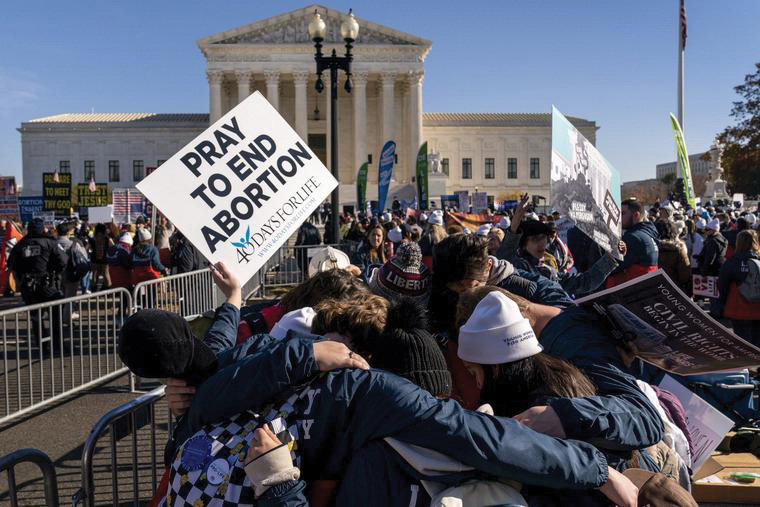It has been just over a year-and-a-half since the Dobbs v. Jackson Supreme Court decision in June of 2022 that overturned Roe v. Wade. It was one of the most controversial recent decisions of the Supreme Court. Supporters of the decision celebrated the monumental victory for the pro-life movement, while opponents decried the decision for removing the previously-recognized right to abortion.
However, it has not had as drastic a statistical effect as one would assume. The Guttmacher Institute, a reproductive rights advocacy group, estimates that there were an estimated 930,000 abortions in the United States in 2020. Their estimates for 2023 through ten months were 878,000, with an average of 88,000 abortions per month. Therefore, an expanded estimate for the year would be approximately 1,054,000 legally provided abortions.
The evidence suggests that legal abortions rose in the year following the Dobbs v. Jackson decision, despite additional restrictions or bans on abortions in approximately half of U.S. states. According to the Guttmacher Institute, this followed an increase in abortions from 2017 to 2020. While several states saw substantial decreases in their reported abortion totals, others saw correlational increases.
The overturning of Roe v. Wade was a very important milestone in the fight to save the lives of those not yet born, but it is not the final step.
As we have seen in elections since the Dobbs decision, the majority of Americans still oppose the overturning of Roe v. Wade. Therefore, I would argue that the most important steps people can take to protect the lives of the unborn are not just to fight to change laws, although that is important. The most important thing we can do is try to change hearts.
The United States of America, for all its great accomplishments, has had points in its past where grievous mistakes were made. Some of those evils were popular with the majority or with certain areas and populations of the country. Issues like slavery and segregation didn’t change overnight. It required changing the popular opinion. This did not mean convincing everyone, but it did require convincing enough people to push the government to pass laws to right those wrongs.
The sheer number of abortions is staggering. The current leading cause of deaths in the United States according to the CDC is heart disease, taking 695,947 lives per year. The Guttmacher Institute’s estimate of around 1,000,000 abortions per year far surpasses this number. In fact, if added to the CDC’s total of 3,464,231 deaths in 2021, it would make up nearly a fourth of all deaths in the United States. That is nearly one million future American citizens that do not get a chance to be born every single year. More than the U.S. casualties from all the wars and conflicts in the last 150 years, according to U.S. News and World Report.
Some might suggest that these numbers should not count as human deaths in the United States. However, as Dr. Stephen A. McCurdy said in a paper in the National Institute of Health in 2016, “The biologic nature of the fetus is in the realm of verifiable scientific fact and admits but one answer: the fetus is a unique human life. To argue otherwise is irrational and deeply anti-scientific.” The fetal human is a stage of human development, not a stage in the process of becoming a human. Even the word fetus is Latin for baby or little one.
In his paper, McCurdy points out several different shared secular ethical values that oppose abortion. For example, most ethical systems are based on a system of reciprocity, or “The Golden Rule.” McCurdy said, “In the context of abortion, because we ourselves appreciate living, and therefore not having been aborted, we in turn should not take human life through abortion.”
Abortion also disproportionately affects the Black community. Planned Parenthood, the leading provider of abortion services in the U.S., was founded by Margaret Sanger, who supported eugenics and racist organizations, according to a statement by Planned Parenthood in 2014.
In terms of coming to the defense of the vulnerable, who deserves our protection more than those who have no voice or way to defend themselves? The preborn baby has not done anything wrong, and yet has no defense.
I would argue that many people today may personally oppose abortion, but believe they should not let their personal convictions influence laws or other people. However, this same sentiment has existed at different points in regards to other issues, such as slavery. Despite slavery being a right guaranteed by the law at the time, abolitionists still sought to show that the right to life and freedom trumped the property “right” of slave-holders. The right to one’s own life should be primary over other rights, such as property or reproductive choice.
Furthermore, what separates the newborn from the preborn? To suggest that there is any difference between a newborn and that same baby a week earlier that would allow the killing of the one but not the other is inconsistent and illogical. Where does one draw the line where a human life can be taken and where it should be preserved?
Just as a human goes through different stages of development from baby to toddler to child to adolescent to adult, it goes through different stages of development in the womb. This level of inconsistency in deciding when a baby can be aborted is simply untenable.
Advocates for abortion warn against ascribing “personhood” to the unborn child. However, isn’t recognizing the fact that each fetus is a unique human life grounds enough that it deserves protection? Every pro-choice advocate had the chance to be born, and yet support denying that chance to nearly one million people every year in the United States. That is why we should work tirelessly to change hearts and minds to see the end of this modern-day evil.









